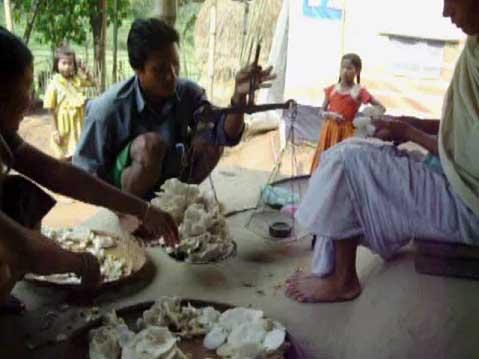The mushroom industry in Assam initiated in the early 90’s by Assam Science and Technology Environment Council (ASTEC) taking a group of youths to Pradhan in Madhya Pradesh for training on mushroom production. Soon Small Industrial Development Bank of India (SIDBI) promoted mushroom cultivation activity through training facility at Santi Sadhana Ashram in Guwahati with technological support from them Regional Research Laboratory (RRL) Jorhat. Dr Y Rathaya, Dr Robin Gogoi of the Assam Agriculture University (AAU) Jorhat and Dr R K Adhikary of RRL along with scientists from Defense Research Laboratory (DRL) Tezpur taking up intensive effort in popularizing this unique activity. With support from all this initiatives and with technical assistance from the National Council for Mushroom Research and Training (NCMRT) Solan now Directorate of Mushroom Research (DMR) a pioneering organization named Protein Food started with the 1st fully equipped private commercial Spawn Production Unite in the entire Northern India in the year 1995 with support from National Small Industries Corporation and Central Bank of India. Further in 1996 with the initiation of Mr Binod Choudhary retired Deputy Director Agriculture Deptt, Professor Shri Binod Baruah and many such youths started an unique and innovative organization Mushroom Development Foundation (MDF) paving a new era of development of mushroom cultivation among the small and marginal farmers mainly in North East India. MDF initiative in advocacy and policy formulation has resulted in many fold funding and development activities to be taken up in several states and organization in the North Eastern States. Among hundreds of development initiatives by MDF some of the significant being Assam Rural Infrastructure Agricultural Support Project (ARISP) , State Institute of Rural Development (SIRD) Assam, District Industries Meghalaya including several international funding in this sector from The Clarence Foundation USA, The Ashoka Innovators for the Public and several more foreign investment in this sector. This efforts accumulated together around mushroom cultivation is paving a unique road progressing towards the needs of a strategic road map for coordination and networking among all the developing agencies in the North East in creating a common platform for bringing these efforts into a sustainable industry.


The hook that has caught mushroom is for it being tasty and a healthy food and at the same time it is easy to cultivate it at low cost giving high returns. In a developed country 7 out of 10 people eat mushroom regularly and in Indian markets demand for mushroom is growing at over 25% PA (Data as per MAC Plan by Ministry of Food Processing). The world market for mushrooms has crossed $45 Billion today. The agro-climatic conditions in North East are conducive for Mushrooms and the availability of raw material is good for several species of mushroom to be grown in a cost effective manner. Further Mushrooms have the potential to impact livelihoods of poor, landless and marginalized farmers as it takes much lesser space to grow as it is cultivated inside a house vertically making it ideal for women to pursue this occupation at their home. Further there is a big scope to develop a parallel collection and distribution system in the market from the farmer’s perspectives. This gives an opportunity to the small and marginal farmer to have an additional income and potential to participate in the market dynamics using mushroom as a tool while keeping a scope for pursuance in integration of their regular produced commodities.

Lack of awareness on mushroom cultivation especially among the farmers and on mushroom consumption among the non tribal population was an initial problem but the real problem in agriculture is the non existence of a pro-farmer value chain. This has led to emergence of several socio-economic issues among the small and marginal farmers that provide inconsistent financial returns as quality production inputs and the market for the produce is often beyond their reach. The farmers are mostly confined into very small economic sizes and cost of the last mile supply chain to reach out to them is extremely high which results in poverty trapping and several underlying problems for them. Further they have little control on their collection and distribution which results in poor negotiating power of farmers in the market. This has led to catastrophic (about 9 million farmers left farming 2012) effects upon the environment as the farmers are increasingly losing their right to choose traditional mix cropping patterns and nutritious crops of their choice and are virtually forced by the market forces to go for large scale mono cropping. Mushrooms could give some of them an additional income which will help them to work out an innovative system for the entire farming community to participate in the market economy by addressing the following issues:
- Limited scope for optimum utilisation of their resources/time in terms of economic gain.
- Non existence of cost effective access to technology and inputs.
- Lack of common platform for sharing of livelihood based information.
- Multiple stakeholders in sourcing outputs directly by the villages.
- Lack of Socio-economic community based governance mechanism.
- High levels of poverty due to under employment.
- Low skills of entrepreneurship for being unaware of the opportunities around their livelihoods.
- No support system or last mile supply chain for small players meaning there is no safety net and the cost of failure is very high.
- High presence of middle men which reduces bargaining power of farmers
- Rights to livelihood for small farmers, women and children constantly violated.
The effort in finding solution to the mushroom industry for sustainability from the small producer’s perspective has the best potentiality through a hybrid model of a not-for-profit and a for-profit entity to work together in the process. In order to achieve a fair balance between people and profit to alleviate poverty and strengthen economy in a sustainable manner developing a social enterprise to pursue one stop solution by:
- Developing in-house technological support system by establishing a Mushroom Spawn Lab with quality control (R&D) facility.
- Developing a scientific and farmer friendly training program for capacity building of farmers, mater trainers and entrepreneurs.
- Community participation in creating awareness, process of development and governance.
- Development of low cost technologies for production enhancement with cost effectiveness.
- Empowering the community in establishing collection and distribution system (C&DS).
- Organizing community associations of C&DS to create distribution networks in clusters.
- For creating a producer company with all the participating farmers/entrepreneurs establishing one common brand.
- Institutionalizing the best practices and knowledge accumulation for replication, regulation and policy formulation.
The coordinated effort of MDF has so far resulted into achieving:
Since 1994: have trained over 20000 farmers in 8 states, covering over 1000 villages; groomed 200 Master-Trainers & 600 entrepreneurs.
Since 2005 organized farmer’s federations and hundreds of entrepreneur’s capacities were built for replicating the model of hub and spoke across the region.
Since 2010 pursued cluster development with community governance mechanism.
Started Eco-Friendly Integrated Livelihood program (E-FILM) 2010 accumulating the grassroots’ knowledge & aspirations integrating cost effective structural, technological, social and agricultural innovative systems in developing the value chain in many clusters of villages.
Growth in turnover and investments increased from Rs 20000 and Rs 4 lakhs respectively in 1995 to over Rs 25 Lakhs and Rs. 1 crore in 2012.
Over 3000 farmers’ income increased from Rs 2000 PA to over Rs 10,000 PA from mushrooms.
Govt. of Assam, IFAD, SIRD etc. appointed us consultants for various government/donor run livelihood programs and over 100 C&DCs community buildings were built in the process.
Over 100 mushroom entrepreneurs‘income increased from Rs 30,000 to Rs 500,000 PA.
The hybrid model needs to focus on developing an ambitious ‘E-FILM project’ to showcase results in one of the poorest districts of North East and simultaneously organizing the existing clusters by doing the following in the next 5 years:
- Organizing farmer’s federations and linking small and marginal farmers with technology, markets and finance.
- Building capacities of mushroom entrepreneurs so that they replicate the model of hub and spoke and provide additional income and nutrition to small farmers and entrepreneurs collectively in a mission mode.
- The clubs of farmers will be developed by the mushroom entrepreneurs and integrated in clusters with community governance mechanism built into the system.
- Developing the collection and distribution system through C&DCs with MIS& GIS.
The above needs coordination and networking among all the developing agencies in the North East in creating a common platform and this flagship initiative taken up by MDF named as E-FILM with activity sequencing as follows:
- Action Research/ base line survey: Publicity, awareness and mass mobilization for mushroom.
- Mass Sensitization and demonstration on Mushroom Cultivation with a demonstration kit.
- Follow up for identifying entrepreneur farmers
- Training on Mushroom Cultivation for Entrepreneurs
- Handholding for cultivation in the field
- Facilitating availability of Subsidized Inputs
- Skill Building in C&DC operations with resource mapping
- C&DC infrastructure, MIS-GIS development
- Market and Credit Linkage
Going forward, MDF’s socio economic project E-FILM aims in bringing other livelihood opportunities to create balanced growth by achieving cost effective marketable solutions through forward marketing. It aims to do this through integrated livelihood analysis and mapping by developing a supply chain management system through which every income generating activity will integrate raw material procurement and track production through innovative technology solutions backed by a strong Monitoring Information System (MIS) & Geographic Indication System (GIS) system for ensuring a fair and steady revenue stream to the stakeholders in the most cost effective manner.
Likely outcomes in finding sustainable solution from this quest for the small and marginal producers will be:
- Increase in household incomes and incomes in hand of women/family.
- Improvement in women’s decision making power and control over income.
- Reduction in percentage of undernourished women and children due to stunting, weight reduction and BMI numbers.
- Community based common economic platform created for finding balance of ecology with market dynamics.
- Enhance food production with fair trade to alleviate poverty.
The above is to be achieved by a producer company formed among the farmers/entrepreneurs coming together in bringing a Brand North East image. So far the only agro-industrial concern specialised in mushroom since 1994 in North East M/S Protein Food with, Export Import, FPO, ISO 9001-2008 Certified and ‘mushfill’ trade mark registered brand may pave this road in creating the producer company in setting up a pan North East Farmers Producer Company in finding a sustainable solution and Mushroom Development Foundation creating the linkages and working as a regulator in developing a sustainable social enterprise.
- Add new comment
- 37920 reads










Comments
We want to do mushroom
I want to know the detail
Good day!
I would like to buy milky
Sir, I am a defence person
I need paddy straw mushroom
Add new comment